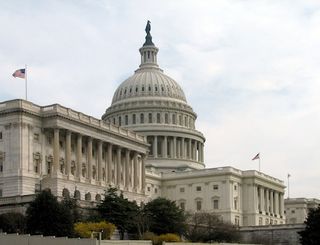Bipartisan Online Speech Bill Passes

Appropriately for a lame duck Congress, legislators in Washington, D.C., have concluded that trying to prevent the right to gripe online will no longer fly.
The Senate Monday unanimously passed a bipartisan bill hailed as striking a blow for online free speech. The bill now heads to the President's desk.
The Consumer Review Fairness Act of 2016 (H.R. 5111) had already passed the House in September.
The bill effectively disallows so-called "anti-disparagement clauses" that are meant to prevent negative online reviews by making them punishable by fines or promising lawsuits as part of those lengthy terms of service agreements that most people likely do not pore over before using an online service.
Such a clause is void from the outset if it: "(1) prohibits or restricts an individual who is a party to such a contract from engaging in written, oral, or pictorial reviews, or other similar performance assessments or analyses of, including by electronic means, the goods, services, or conduct of a person that is also a party to the contract; (2) imposes penalties or fees against individuals who engage in such communications; or (3) transfers or requires the individual to transfer intellectual property rights in review or feedback content (with the exception of a nonexclusive license to use the content) in any otherwise lawful communications about such person or the goods or services provided by such person."
The bill does not immunize online reviewers from civil actions for defamation, slander or libel or prevent any party's right to remove anything that is "false or misleading, harassing, abusive, obscene, vulgar, sexually explicit, inappropriate with respect to race, gender, sexuality, ethnicity, or other intrinsic characteristic," so it is not a flat prohibition and could contain some wiggle room in terms like "misleading" or "abusive."
“By ending gag clauses, this legislation supports consumer rights and the integrity of critical feedback about products and services sold online. I appreciate the bipartisan efforts of my Senate and House colleagues to get this legislation over the finish line,” said Senate Commerce Committee chairman John Thune (R-S.D.) following Senate passage.
Broadcasting & Cable Newsletter
The smarter way to stay on top of broadcasting and cable industry. Sign up below
The committee held a hearing on the clauses at which the plaintiff in a lawsuit said a company had demanded that a negative online review be taken down because there was a non-disparagement clause in the terms of service, then demanded a $3,500 fine when it was not taken down, then when it was not paid reported that to a credit agency.
Rep. Darrell Issa (R-Calif.), who co-sponsored the bill, which is similar to one he introduced last year, said the legislation was needed "after a number of consumers have found themselves in court, fighting multi-million dollar lawsuits for leaving negative – but truthful – reviews of companies' services on sites like Yelp or TripAdvisor."
"The internet is supposed to be an open-forum for the free exchange of ideas of all kind," Issa said. "But how free is that exchange, really, if it’s been cherry-picked and censored to weed out things some people find unfavorable? The bill we’ve now sent to the President’s desk will ensure that the internet remains a place where the freedom of speech can thrive and protect honest consumers from retaliatory litigation."
“Reviews on where to shop, eat, or stay on websites like Yelp...[which had strongly backed the bill] and TripAdvisor help consumers make informed choices about where to spend their money," said Communications Subcommittee ranking member Brian Schatz (D-Hawaii). "Every consumer has the right to share their honest experiences and opinions of any business without the fear of legal retaliation, and the passage of our bill brings us one step closer to protecting that right."
Contributing editor John Eggerton has been an editor and/or writer on media regulation, legislation and policy for over four decades, including covering the FCC, FTC, Congress, the major media trade associations, and the federal courts. In addition to Multichannel News and Broadcasting + Cable, his work has appeared in Radio World, TV Technology, TV Fax, This Week in Consumer Electronics, Variety and the Encyclopedia Britannica.

